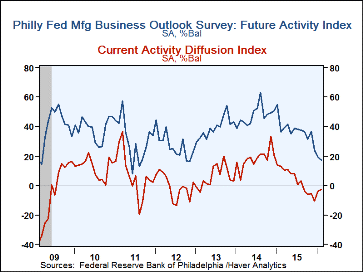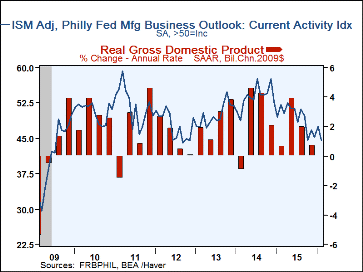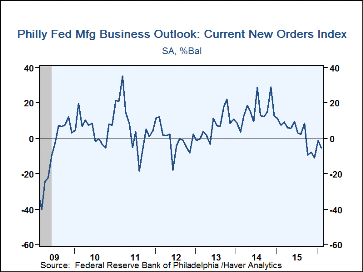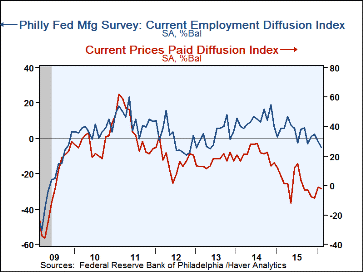 Global| Feb 18 2016
Global| Feb 18 2016Philadelphia Fed Business Conditions Index Is Negative
by:Tom Moeller
|in:Economy in Brief
Summary
The Philadelphia Federal Reserve reported that its General Factory Sector Business Conditions Index for February remained negative at -2.8 versus -3.5 in January. It was the sixth consecutive reading below zero, although losses have [...]
The Philadelphia Federal Reserve reported that its General Factory Sector Business Conditions Index for February remained negative at -2.8 versus -3.5 in January. It was the sixth consecutive reading below zero, although losses have moderated since December. The latest reading matched expectations in the Action Economics Forecast Survey.
The ISM-adjusted General Business Conditions Index constructed by Haver Analytics deteriorated to 44.7 from 47.5. It remained below 50 for the seventh month in the last eight. It is comparable to the ISM Composite Index. During the last ten years, there has been a 71% correlation between the adjusted Philadelphia Fed Index and real GDP growth.
Each of the components of the overall index deteriorated versus January. New orders and unfilled orders both fell sharply m/m, while shipments showed a slower rate of increase. The vendor delivery index became more negative, continuing to suggest faster delivery speeds, and inventories fell. The employment measure remained negative for a second month. During the last ten years, there has been an 81% correlation between the jobs index and the m/m change in manufacturing payrolls. The length of the average workweek shortened substantially.
On the pricing front, the prices paid index showed deflation for a sixth consecutive month. Nineteen percent of respondents paid higher prices, while 21% paid less. The prices received measure remained negative.
The future business activity index deteriorated sharply to its lowest level since November 2012. Expected new orders, shipments and unfilled orders fell significantly. Employment also deteriorated, along with capital expenditures and prices paid.
The survey panel consists of 150 manufacturing companies in Federal Reserve District III (consisting of southeastern PA, southern NJ and Delaware.) The diffusion indexes represent the percentage of respondents indicating an increase minus the percentage indicating a decrease in activity. The ISM adjusted figure, calculated by Haver Analytics, is the average of five diffusion indexes, new orders, production, employment, supplier deliveries and inventories with equal weights (20% each). Each diffusion index is the sum of the percent responding "higher" and one-half of the percent responding "same."
The figures from the Philadelphia Federal Reserve can be found in Haver's SURVEYS database. The Action Economics figure is available in AS1REPNA.
| Philadelphia Fed (%, SA) | Feb | Jan | Dec | Feb'15 | 2015 | 2014 | 2013 |
|---|---|---|---|---|---|---|---|
| ISM-Adjusted General Business Conditions | 44.7 | 47.5 | 45.2 | 52.1 | 49.4 | 53.7 | 50.0 |
| General Factory Sector Business Conditions | -2.8 | -3.5 | -10.2 | 13.0 | 3.6 | 18.3 | 6.1 |
| New Orders | -5.3 | -1.4 | -11.1 | 7.7 | 2.9 | 14.9 | 7.2 |
| Shipments | 2.5 | 9.6 | -2.1 | 8.2 | 3.0 | 16.1 | 6.8 |
| Unfilled Orders | -12.7 | -8.8 | -17.6 | 8.5 | -5.1 | 3.3 | -3.9 |
| Delivery Time | -16.1 | -7.6 | -6.1 | -3.3 | -4.1 | 0.6 | -4.1 |
| Inventories | -17.1 | -15.7 | -5.7 | 13.0 | -1.5 | 1.7 | -3.5 |
| Number of Employees | -5.0 | -1.9 | 2.2 | 5.7 | 3.9 | 10.5 | 1.4 |
| Prices Paid | -2.2 | -1.1 | -8.3 | 6.6 | 1.5 | 21.6 | 16.4 |
Tom Moeller
AuthorMore in Author Profile »Prior to joining Haver Analytics in 2000, Mr. Moeller worked as the Economist at Chancellor Capital Management from 1985 to 1999. There, he developed comprehensive economic forecasts and interpreted economic data for equity and fixed income portfolio managers. Also at Chancellor, Mr. Moeller worked as an equity analyst and was responsible for researching and rating companies in the economically sensitive automobile and housing industries for investment in Chancellor’s equity portfolio. Prior to joining Chancellor, Mr. Moeller was an Economist at Citibank from 1979 to 1984. He also analyzed pricing behavior in the metals industry for the Council on Wage and Price Stability in Washington, D.C. In 1999, Mr. Moeller received the award for most accurate forecast from the Forecasters' Club of New York. From 1990 to 1992 he was President of the New York Association for Business Economists. Mr. Moeller earned an M.B.A. in Finance from Fordham University, where he graduated in 1987. He holds a Bachelor of Arts in Economics from George Washington University.
More Economy in Brief
 Global| Feb 05 2026
Global| Feb 05 2026Charts of the Week: Balanced Policy, Resilient Data and AI Narratives
by:Andrew Cates










